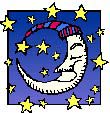A Good Night’s Sleep
 Every living creature needs to sleep. We probably need more rest than any other animal because our lives are so complicated and our brains so complex.
Every living creature needs to sleep. We probably need more rest than any other animal because our lives are so complicated and our brains so complex.
Humans sleep and awaken in a fairly constant 24-hour rhythm called a circadian rhythm. When the brain is aroused or awake, it is in a state of readiness and able to react consciously to various stimuli.
Everyone needs a period of rest within every twenty-four hours. Our brains are so active that after 16 hours of activity you may feel “fried” or “burned-out”. This is because your brain has become deprived of the necessary energy it needs to function while you are awake. After about eight hours of sleep you may find the same brain “recharged” and ready for a full day of activity. Only sleep will refurbish brain cells. You can’t live without it.
Sleep is a very complex process . The brain has at least two centers that are involved with our ability to sleep and with the ability to stay asleep. Every organ in our body goes into “neutral” when we sleep, from the control center — our brain. Our heart rate slows down, our breathing slows and the body’s temperature drops.
 Many scientists believe that dreaming is what helps our brain restore itself and prepares it for the next day. Sleep studies have been in process for years and years, and dreaming is still considered essential for a good night’s sleep — some say the most important function of sleep. Even if you don’t remember your dreams, we all dream. The debate over the function of dreams will most likely continue until we get a better understanding of the complexity of the human brain.
Many scientists believe that dreaming is what helps our brain restore itself and prepares it for the next day. Sleep studies have been in process for years and years, and dreaming is still considered essential for a good night’s sleep — some say the most important function of sleep. Even if you don’t remember your dreams, we all dream. The debate over the function of dreams will most likely continue until we get a better understanding of the complexity of the human brain.
As you get older, your sleep will become briefer, lighter and more disrupted. Right now, you need lots of sleep — ideally eight hours. Other experts think that teenagers need nine or ten hours of sleep. Just try to sell yourself short on sleep and you’ll be more irritable, less productive and a health hazard if you drive or operate equipment.
Some Practical Ways To Get Restful Sleep
- You’ll sleep deeper and more easily if you are physically tired, so make sure you get some exercise each day.
- Try to go to bed an hour or so earlier for at least 10 days. Keep a diary. Note how good you feel during the day compared to the way you felt before.
- Try to go to sleep and get up at the same time each morning — even on weekends.
- Try not to nap — especially in the late afternoon or evening. Some people, however, suggest taking a power nap. Do a test to find out if napping affects your sleep.
- Avoid exercising just before bedtime. It may actually keep you awake.
- Make sure your feet aren’t cold and that the room temperature is comfortable.
- Try drinking a glass of warm milk with honey at bedtime. Some people recommend the amino acid L-tryptophan. (Studies have shown that the supplement melatonin may NOT be safe for use by teenagers.) Stay away from tea, coffee and chocolate. They will keep you awake.
- Avoid loud music, big meals, arguments and exciting television shows that might over stimulate you at night.
- Don’t eat a heavy meal just before you plan to go to bed and avoid caffeine, alcohol and nicotine in the evening. (Of course we don’t want you to smoke or drink, but you have to make that decision for yourself.)
- Make the countdown to bed a relaxing routine that keeps your mind off the day’s problems. Wind down before you go to bed by listening to quiet music, reading something other than a schoolbook, or taking a warm bath or shower.
- Sleep on a comfortable bed, in a dark, quiet room. Use your bed only for sleeping, not for studying and other activities. Keep your schoolbooks or reminders of work or personal problems off your bed and, if possible, out of your bedroom.
- Once you get into bed, calm your mind with meditation or by slowly relaxing each set of muscles. Try relaxation and imaging techniques — even counting sheep or imagining balloons rising one by one into the air. See self-massage for relaxation techniques.
- Don’t lie awake in bed for more than 30 minutes. Get up and do something until you’re sleepy again.
- Avoid over-the-counter (OTC) sleeping aids. Most nonprescription sleep drugs rely on antihistamines which have sedative side effects and make you drowsy. While they work for some people, about one in four people has side effects, including dry mouth, dizziness, urinary retention, constipation, nausea, blurred vision, or increased heart rate. And while OTC sleep aids are less powerful than prescription drugs, they can still become habit forming. If you already take an antihistamine for allergies, then you surely want to avoid taking another without the advice of your health care provider.
Get Info on Triple Complex Sleep Tonic
![]() Insomnia
Insomnia
by William Bulman, MD
![]() Although the term insomnia is used to describe a multitude of sleep disturbances, most people complain of one of a few specific problems with their sleep patterns: poor sleep quality, difficulty in initiating sleep, nighttime arousals, or insufficient quantity of sleep. Difficulty in initiating sleep is most often a problem with what doctors refer to as “sleep hygiene” – the activities that precede and surround the act of going to sleep. Daytime napping, drinking alcohol or caffeine-containing beverages in the evening, or routinely using one’s bed for awake activities like reading or watching TV can make falling asleep or staying asleep difficult. (Please see our links below for a full discussion of this topic).
Although the term insomnia is used to describe a multitude of sleep disturbances, most people complain of one of a few specific problems with their sleep patterns: poor sleep quality, difficulty in initiating sleep, nighttime arousals, or insufficient quantity of sleep. Difficulty in initiating sleep is most often a problem with what doctors refer to as “sleep hygiene” – the activities that precede and surround the act of going to sleep. Daytime napping, drinking alcohol or caffeine-containing beverages in the evening, or routinely using one’s bed for awake activities like reading or watching TV can make falling asleep or staying asleep difficult. (Please see our links below for a full discussion of this topic).
Although not common, problems with initiating sleep may be the result of underlying medical illness. In fact, disruptions of the normal sleep cycle are often some of the earliest clues that disease is present and, in certain circumstances, are the only warning signs that a problem exists.
Subtle signs of illness: Depression is perhaps the best example of a medical condition that can present with subtle sleep disturbances. Depression frequently results in difficulty with falling asleep or with staying asleep, and early morning awakening is a common symptom. In many instances these symptoms can be much more prominent than actual depressed mood, and both doctors and patients may overlook these subtle signals. New problems with sleep, often accompanied by daytime fatigue, loss of interest in daytime activities, or unplanned weight loss are often warning signs of serious but treatable depression.
Nighttime arousal is another common sleep-related complaint that can point to a specific medical problem. Many chronic medical conditions have symptoms that flare during sleep, causing frequent mid-sleep awakenings and resultant daytime fatigue. These conditions can develop very slowly over time, leaving people unaware that they have a significant problem.
![]() Get Info on Triple Complex Sleep Tonic – It helps me. ~ Amy, RN, 2006 ~
Get Info on Triple Complex Sleep Tonic – It helps me. ~ Amy, RN, 2006 ~
![]() Get Info on Serenite-LT for Long Term Solution to Chronic Insomnia – Not intended for women taking birth control pills as It contains St. John’s Wort.
Get Info on Serenite-LT for Long Term Solution to Chronic Insomnia – Not intended for women taking birth control pills as It contains St. John’s Wort.
For more on Sleep Disorders…
![]() What You Can Do About Sleep Deprivation by: C. Stampi, M.D., Ph.D.
What You Can Do About Sleep Deprivation by: C. Stampi, M.D., Ph.D.
![]() The Effects of a Poor Nights Sleep
The Effects of a Poor Nights Sleep
![]() How Diet Affects Your Sleep
How Diet Affects Your Sleep
![]() Restless Leg Syndrome
Restless Leg Syndrome
![]() NEW – Little Rest for the Traumatized
NEW – Little Rest for the Traumatized
![]() Check out the Sleep Disorders Focus Area, it has helped many readers!
Check out the Sleep Disorders Focus Area, it has helped many readers!
